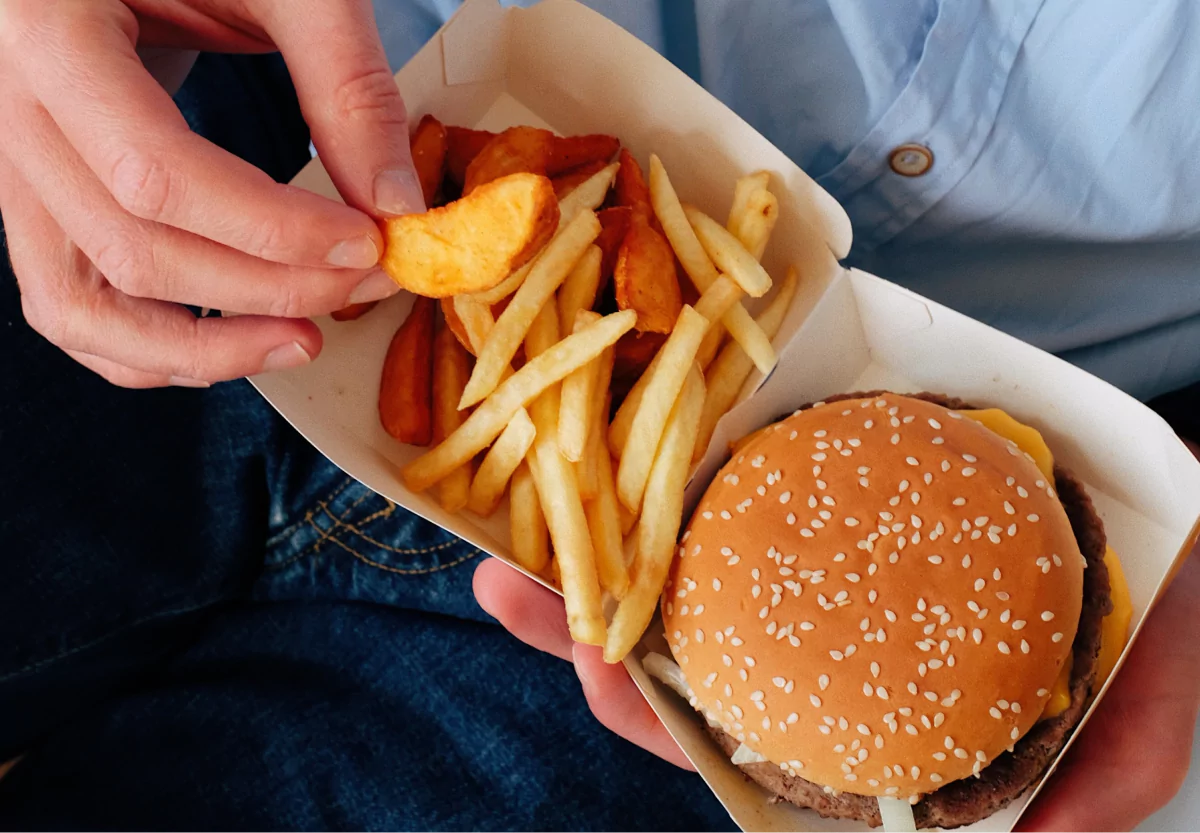How Blood Sugar Can Affect Your Acne

Key Takeaways
Acne is a common inflammatory skin condition that affects millions of people worldwide. While many different genetic and environmental factors may cause acne, research also suggests that what you eat can also have an effect on your skin.
With that in mind, it may not be surprising to learn that blood sugar and acne can also be closely related. Does that mean that stabilizing your blood sugar levels and optimizing your diet could support clear skin?
In this article, we will explore how diet and blood sugar can affect acne and what steps you can take to manage your blood sugar levels and potentially improve your skin health.
Foods That Can Negatively Impact Your Blood Sugar Levels

Your blood sugar levels are highly influenced by your diet. When you eat, glucose is released into the blood, which is used by your cells for energy or stored for later use.
When blood sugar levels become too high, it can have a negative impact on your health. Here are some foods that can have a negative impact on blood sugar levels:
Refined Grains
Research shows that people who have a diet high in refined grains are more likely to develop type 2 diabetes. This is in part because refined grains and simple carbohydrates, such as white bread, pasta, and white rice, are highly processed and have been stripped of their fiber, as well as many vitamins and minerals.
These foods are quickly broken down into glucose and enter the bloodstream, which can cause a spike in blood sugar levels. In response to a blood glucose spike, the pancreas releases insulin to help cells absorb the excess glucose from the bloodstream.
Over time, repeated spikes in blood sugar levels may increase risk insulin resistance, which can increase your chance of developing type 2 diabetes. Insulin resistance has also been linked to the development of acne.
Fried and Fast Foods

Fried and fast foods are typically high in calories, unhealthy fats, sodium, and added sugars, and low in fiber and essential nutrients. These types of foods are often highly processed and have been linked to a range of health problems when consumed in excess.
Like refined grains, fried and fast foods are rapidly digested by the body, leading to a quick increase in blood sugar levels. These foods tend to have high glycemic loads, meaning that they’re more likely to negatively affect blood sugar.
But the lack of nutrients in conventional fast and fried food is also to blame: one study found that consuming a nutrient-rich meal reduced postprandial glucose and insulin by 44 percent when compared to a less nutritious fast food meal, even though both meals had a similar glycemic load.
Highly Processed Foods with Added Sugars
Consuming highly processed foods has been shown to increase the risk of type 2 diabetes. Foods that are highly processed tend to contain more ingredients like added sugar and trans fats, which can negatively affect metabolic health.
Consuming foods high in added sugars can also promote weight gain by encouraging overeating and preventing feelings of fullness. Obesity is a significant risk factor for insulin resistance and type 2 diabetes.
Sugary Drinks

Sugary drinks, like juice and soda, may be particularly harmful for blood sugar levels as they are often high in added sugars that can cause blood sugar to spike. Sugary drinks also contribute to weight gain, especially around the belly, which can lead to a higher risk of high blood sugar and diabetes.
Sugary drinks also don’t typically lead to feelings of fullness, which can make you consume a larger portion that you would of another food.
Nutrition and Skin Care: How They’re Connected
There is a strong correlation between nutrition habits and healthy skin. Our diet greatly impacts our metabolic health, which is connected to our skin health.
A diet that is rich in whole foods, lean proteins, healthy fats, and fiber can help reduce the risk of metabolic syndrome and its associated complications. Research has shown that certain dietary patterns, like a low-glycemic diet, may reduce the risk of acne vulgaris and improve overall skin health.
A diet that is high in processed foods, refined carbohydrates, and added sugars, on the other hand, can lead to both frequent spikes in blood sugar levels and inflammation. This may exacerbate acne and other skin conditions.
This is partly because of blood sugar: when blood sugar spikes, it can cause inflammation in the body, which can lead to acne. Blood sugar spikes can also cause the body to produce excess sebum, an oily substance in skin that causes acne.

Drinking plenty of water can help keep your skin hydrated, while a diet rich in vitamins and minerals, like zinc, selenium, and vitamins A, C, and E, can help:
- Support skin cell turnover
- Protect the skin from UV damage
- Boost skin hydration
- Help produce substances that benefit the skin, like collagen, elastin, and ceramides
It’s important to remember that consuming excessive amounts of these nutrients or any vitamins or minerals has not been shown to improve skin. Adequate intake, without excess, is a good goal.
Healthy Foods to Include in Your Diet
Healthy, nutrient-dense foods may help reduce the risk of acne flare-ups, pimples, and other skin sensitivities. Here are some foods you should consider including in your diet, if tolerated:
- Fruits and vegetables: Leafy greens, berries, tomatoes, and cruciferous vegetables, are rich in vitamins, minerals, and antioxidants that can help protect the skin. They are also high in fiber, which can help regulate blood sugar levels. are all good options.
- Whole grains: such as brown rice, quinoa, and buckwheat are rich in fiber and complex carbohydrates that can help keep blood sugar levels balanced and reduce inflammation. However, if you are sensitive to gluten-containing grains like wheat, it’s possible that gluten might need to be reduced or avoided.
- Healthy fats: like omega-3 fatty acids can help reduce inflammation and benefit inflammatory skin problems like acne. Appropriate amounts of omega-6 fatty acids are needed for skin health as well. Omega-9 fatty acids, representing one of the most common monounsaturated fats, have been shown to benefit skin health. Olive oil, avocados, fatty fish, and nuts and seeds are all good sources of healthy fats.
- Probiotics: found in fermented foods like yogurt, kimchi, and sauerkraut, may help promote a healthy gut microbiome, which may influence skin health. Gut health can have a big impact on skin health, but for more comprehensive gut health support, it may be helpful to work with a personal dietitian.
Tips for Reducing Your Acne Breakouts

Diet is not the only factor that affects skin health. Here are some more tips for reducing acne breakouts:
1) Develop a Skin Care Routine
A good skin care routine can greatly benefit your skin health. The number of products available can be intimidating, and it’s okay to start with just a gentle cleanser, moisturizer, and regularly-applied sunscreen.
2) Use Non-Comedogenic Skin Care Products
Look for skincare products, such as moisturizers and makeup, with non-comedogenic ingredients, which means they won't clog pores. Non-comedogenic ingredients include:
- Aloe vera
- Witch hazel
- Rose water
- Jojoba oil
- Vitamins C and E
- Cetearyl alcohol
- Glycerin
3) Wear Sunscreen

Wearing sunscreen every day is one of the most important things you can do for your skin. When applied correctly, sunscreen protects your skin from the sun’s UV rays, which can cause sunburn, skin cancer, and premature skin aging.
A broad-spectrum, water-resistant sunscreen with an SPF of 30 or higher to all skin not covered by clothing will provide the best protection. Make sure to apply it every two hours, and after swimming or sweating.
4) Avoid Touching Your Face
Touching your face can spread bacteria and oil from your hands to your face, which can worsen acne. Try to avoid popping or squeezing pimples, which can cause scars.
It’s important to remember that everyone's skin is different, and what works for one person may not work for another. It may take some trial and error to find the best approach for managing your acne, so be patient and consistent with your skincare routine and healthy habits.
When to Reach Out For Help with Acne

If you are struggling with acne or blood sugar regulation, it may be helpful to seek medical advice from specialists who can provide personalized treatment and support. Some specialists to consider include:
- Your primary care physician, who can provide a general evaluation of your overall health and refer you to any needed specialists.
- Dermatologists, who specialize in skin health and disorders, can provide treatments and recommendations for managing acne, as well as other skin conditions.
- Endocrinologists, who specialize in the endocrine system, which includes hormones that can affect skin health and can cause acne breakouts.
- Registered dietitians and licensed nutritionists, who can offer guidance on creating a customized diet plan that supports overall health, helps keep blood sugar levels balanced, and meets your nutritional needs. They may also be able to help you identify and address any food sensitivities you might be struggling with.
It's important to note that managing blood sugar levels and skin health often involves a multidisciplinary approach, and a team of healthcare professionals may work together to help a patient achieve their blood sugar and skin health goals.
Find the right Nutrisense programto turn insight into progress.
Go Beyond Glucose Data with Nutrisense
Your glucose can significantly impact how your body feels and functions. That’s why stable levels are an important factor in supporting overall wellbeing. But viewing glucose isn't enough. Nutrisense, you’ll be able to learn how to use your body's data to make informed lifestyle choices that support healthy living.
One-to-one coaching
Sign up to access insurance-covered video calls to work with a glucose expert: a personal registered dietitian or certified nutritionist who will help tailor your lifestyle and diet to your goals.
Monitor and measure what matters
With the Nutrisense CGM Program, you can monitor your glucose with health tech like glucose biosensors and continuous glucose monitor (CGM)s, and analyze the trends over time with the Nutrisense App. This will help you make the most informed choices about the foods you consume and their impact on your health.
Find your best fit
Ready to take the first step? Start with our quiz to find the right Nutrisense program to help you take control.

Heather is a Registered and Licensed Dietitian Nutritionist (RDN, LDN), subject matter expert, and technical writer, with a master's degree in nutrition science from Bastyr University. She has a specialty in neuroendocrinology and has been working in the field of nutrition—including nutrition research, education, medical writing, and clinical integrative and functional nutrition—for over 15 years.


.webp)

